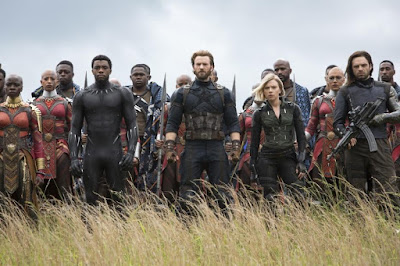Avengers: Infinity War
Avengers: Infinity War - An Unconventional Superhero Blockbuster
This is an unconventional entry in my blog, but this is an unconventional entry in the Marvel Blockbuster Universe. I normally analyze films that are considered "deep", in the sense that they have an underlying hard-to-understand message and require a lot of thought and reflection in order to process the film after watching it. But I decided to write a small text about Infinity War since it surpassed a lot of my expectations and surprised me in a lot of ways. This blockbuster isn't an unconventional and controversial experimental film, in fact, in most of its aspects it's a very regular superhero flick, but there are some very original aspects that make it stand out in a sea of action-filled blockbusters that come out every year. A quick heads-up: there will be SPOILERS in this text, so, if you haven't watched this movie, continue at your own risk.
This movie has two aspects that stand out and are very unconventional in a superhero flick: the villain and the ending.
Starting with the villain. The villain isn't your run-of-the-mill evil power-hungry bad guy. Thanos - the villain, played by Josh Brolin - wants to seize control over the infinity stones - mystical artifacts that hold tremendous power. However, he isn't seeking power, or at least he isn't seeking power to hoard to himself or to have control over the world. He is seeking power for what might surprisingly be considered as an honorable or even ethical reason. He wants those stones to eliminate half of the Universe's population so that everyone can live with plenty of resources and nobody lives with famine or poverty. He wants to create a fairer world.
This is where the interesting part of this aspect lies. Thanos isn't a bidimensional villain with obviously unethical intentions. Thanos has an ethical philosophy behind his actions. He wants to restore balance in the Universe. He is an extremely interesting and ambiguous character, and that is very unusual in superhero movies of this kind. He makes us question our own ideas of what a villain is and what is an ethical action - Is killing half the population of the world so that the other half can have a life of plenty and happiness something ethical? What makes something ethical? Is it the action in itself? Is it the consequences? Is it the intentions?
Another interesting aspect is that Thanos uses this power to kill randomly, ignoring the wealth and power of those killed. He wants to eliminate half of the population, and he wants to do that in a "fair" way (I use fair in quotes because I don't think that it's exactly the best word in this case) and this means to kill with no discrimination. This adds more depth to the character of the villain because it shows that he has a sense of social justice - even though it may be in a somewhat perverted way.
In the end, after Thanos successfully completes his mission, he returns to a humble life. We see him in a hut in the countryside of a lush and green planet. He doesn't seek power in society, he doesn't seek wealth, he doesn't seek fame. He abdicates of his power, for he has done what he wanted with that power. This is particularly interesting because Thanos isn't what most villains are: ambitious, power-hungry and sadistic. He is what could be considered as an anti-hero. He saves the Universe from certain chaos and conflict over resources and returns to his life. This is something very different to what we are accustomed to. It adds a layer to Thanos' character, making him more complex than he was.
And so, we are left with the question: What is Thanos? He may be the most ambiguous and interesting character in the Marvel Universe. Is he a hero or is he a villain? Or is he something in the "gray area"? I guess that's something for each of us to decide.
The second aspect I mentioned is the ending. It is not a happy ending. In fact, it's the exact opposite of that. The Avengers lose. Thanos is able to complete his mission of collecting all the Infinity Stones and destroy half of the Universe's population. What is so interesting about this?
It's interesting because in most superhero flicks the superheroes win. There is always some way, no matter how unbelievable it is, that the superhero finds to save the day. In Infinity War we are to the last moment expecting something to happen, some heroic act, something, anything! It gets to the point where it's almost exasperating. But nothing like that happens. Our beloved Avengers fail. And then something even more shocking happens. Many of them die. This may be the greatest punch to the gut in Marvel history. Many of the heroes we love and are expecting them to live because of their popularity and importance die, almost like in a Game of Thrones episode. And this is a big change to what we are used to seeing in these movies. Something extremely unexpected happens. And we are left with a hole in our hearts where our superheroes used to be.
Infinity War is a superhero film that surprisingly raises philosophical questions and goes away from what is expected in a Marvel flick, leaving us with a deep emotional aftermath. It's not the best Superhero movie ever, unlike I have been hearing some people saying - let's not forget about The Dark Knight and Deadpool. But it's an extremely entertaining and at the same time thought-provoking movie that surpasses expectations and may, in a certain way, blow our minds. Let's just see, in the meantime, what "they" come up with to resurrect all those characters who died - winky face emoji.




Comments
Post a Comment